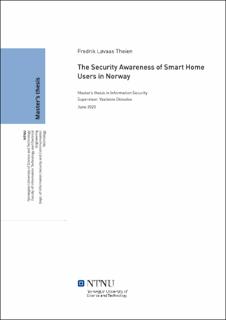The Security Awareness of Smart Home Users in Norway
Master thesis
Permanent lenke
https://hdl.handle.net/11250/2781148Utgivelsesdato
2020Metadata
Vis full innførselSamlinger
Sammendrag
Et smarthus kan være et relativt nytt konsept for mange. Under ideelle omstendigheter bør samhandling mellom brukere og smarthusapparater gjøres sikkert, eller i det minste med en viss grad av risikoforståelse. Imidlertid er det ikke sikkert at sikkerhetsbevissthet har modnet hos folk flest ennå. Derfor vil denne avhandlingen forsøke å identifisere dagens sikkerhetsbevissthetsnivå for smarthusbrukere i Norge, samt analysere deres risikooppfatninger, for å hjelpe fagpersoner med å lage effektive opplæringsprogrammer for bevissthet. Disse målene inkluderer identifisering av bruksmønstre, brukermotivasjoner og rutiner som kan medføre økt risiko i brukernes daglige liv. For å oppnå de ønskede resultatene benyttet jeg en kvantitativ metodikk for å vurdere sikkerhetsbevissthetsnivået til smarthusbrukere i Norge. Resultatene mine viste at bevissthetsnivået til smarthusbrukere i Norge er relativt anstendig, spesielt for smarthusentusiaster. Det var også en forskjell i hvor investerte en er i smarthusøkosystemet, og deres sikkerhetsbevissthetsnivå. Videre viste jeg at de vanligste fallgruvene for økt risiko inkluderer blant annet mangel på nettverkssegmentering og gjenbruk av passord. Til slutt antyder resultatene mine at tap av påloggingsinformasjon, uautorisert tilgang til personlig informasjon og skadelig programvare er blant de høyest oppfattede risikoene for en smarthusbruker. A smart home may be a relatively new concept for many people. Under ideal circumstances, interactions between users and smart home devices should be done securely, or at least with some level of risk understanding. However, security awareness may not have matured in most people yet. Therefore, this thesis will seek to identify the current security awareness level of smart home users in Norway, as well as analysing their risk perceptions, to help professionals create efficient awareness training programs. These objectives include the identification of usage patterns, user motivations and routines which may impose risk amplification in their daily lives. To achieve the desired results, I utilised a quantitative methodology to assess the security awareness levels of smart home users in Norway. My results showed that the awareness level of smart home users in Norway is quite decent, especially for smart home enthusiasts. There was also a difference in how invested in the smart home ecosystem one are, and their security awareness level. Furthermore, I showed that the most common pitfalls included lack of network segmentation and password reuse. Lastly, my results suggest that loss of login credentials, unauthorised access to personal information, and malware are among the highest perceived risks for a smart home user.
